Update (March 4, 2022): Between February 28 and March 3, 2022, the Russian authorities blocked access to at least eight Russian media sites, including The Village, Dozhd, Echo of Moscow, DOXA, The New Times, Krym.Realii, Taiga.Info, and the Current Time and several Ukrainian media outlets.
On March 3, the leading independent news radio station Echo of Moscow closed its doors after three decades of uninterrupted broadcasting. The same day, Dozhd TV announced that it would temporarily suspend its broadcasting because the new draft law will force it to lie. Earlier, at least one Russian radio station announced that it would no longer continue broadcasting in its usual format because staff “don’t want to lie” and could not continue their journalistic work. The original news release is at the end of this update, and the following are the most recent developments:
- On March 3, the board of directors of the radio station Echo of Moscow decided to shut down the radio station and Dozhd TV announced that it would temporarily suspend broadcasting.
- Echo of Moscow had over 30 years of uninterrupted, independent broadcasting, since the failed coup by Communist hardliners against the government of Mikhail Gorbachev in August 1991.
- Roskomnadzor, the government media and communications regulator, had already demanded that Google take out Echo’s app from its Play Store.
- The founder and CEO of Dozhd announced that it was suspending its broadcast because of the new draft law criminalizing what the authorities would consider “false news” about Russia’s invasion of Ukraine, with penalty of up to 15 years imprisonment. The bill introduced just a day prior is expected to be adopted on March 4 or within a few days.
- Later the same day, police visited Dozhd and the media outlet received two written warnings about “extremist” information allegedly contained on their YouTube channel. The authorities did not indicate what publication they had determined constituted “extremism.” Dozhd suspects that this means that authorities will also block their YouTube channel.
- On March 2, access to The Village magazine’s website was blocked. The same day, Serebrianny Dozd radio station decided to restrict their broadcast in an apparent act of self-censorship.
- The Village said that it received only one notification on the morning of March 2, demanding the deletion of one news item. It immediately deleted the item. Though under Russian law, a media outlet has 24 hours to comply with a takedown request, the Village was blocked just hours later. The Village said that it learned from a publication by Russia’s state news agency that the authorities accused it of publishing “fake news” about the situation in Ukraine. The Village said that is an urban media outlet that writes about life in Moscow, that it considers the allegations absurd, and that it intends to lodge an appeal in court.
- Radio Serebrianny Dozhd’ (Silver Rain – a radio station different from Dozhd) decided to limit its broadcasting as of March 3 to music and news only, thus abandoning significant portions of their broadcast that contained chat shows, interviews, commentaries, and exchanges between their anchors, in what appears to be an act of self-censorship to avoid being blocked or receiving takedown requests from the authorities. The station posted on its social media: “We are not allowed to tell the truth but we don’t want to tell the lies.” The station said it regretted that this was all it could do and that its staff, as journalists “no longer could perform our [journalistic] duties.”
- On March 1, the Russian authorities blocked access to the websites of both Echo of Moscow and Dozhd, accusing them on social media of “deliberate and systematic” publication of information inciting extremist activity and violence, and of false information about the Russian military’s conduct during the “special operation” in Ukraine. Echo of Moscow’s radio broadcasting was taken off the air by the authorities.
- The editor-in-chief of Dozhd, Tikhon Dziadko said that the Roskomndadzor notification did not specify what content or which webpage it considers having violated the regulations, but only cited Dozhd’s website URL, implying that the entire website fails to comply with censorship requirements. He said that Dozhd’s team were “law-abiding people” who have not violated any of the applicable laws but also said that in the current circumstances “following the norms of the law … is practically impossible.” He later said that he and a number of Dozhd staff members had to leave Russia temporarily because of the action taken to block access to their site and in light of threats they had received.
- After Echo of Moscow was blocked, its chief editor decried the Russian authorities’ allegations, calling them unsubstantiated and insulting to journalists and Russian people. The station said it was determined to challenge the decision in court. The chief editor said that the blocking was politically motivated censorship that is “explicitly banned by the Russian constitution.”
- On February 28, Roskomnadzor blocked access to the student media outlet DOXA; the Siberian media outlet Tayga.info; Krym.Realii media, a project of Radio Free Europe/Radio Liberty focusing on Crimea; and The New Times magazine.
- DOXA said that access was blocked because of a guide it published on “How to Speak to Relatives and Coworkers Who Believe Russian Propaganda.” “The truth cannot be blocked,” the statement said.
- Taiga.info said that it was blocked because of its livestreaming about the war but that it didn’t understand the essence of Roskomnadzor’s claim. It said it would delete the livestream that the authorities had objected to in the hope of being able to continue to operate. Radio Free Europe/Radio Liberty later reported that Taiga.info was blocked for using the word “war” in reference to the armed conflict in Ukraine.
- Krym.Realii wrote that it had not received any notifications from the authorities about their intention to block it. Previously it had received a demand to delete a comment by the Russia opposition figure and chess grandmaster, Garry Kasparov, and publications about conscription of Ukrainian nationals in Crimea.
- The chief editor of The New Times tweeted that she didn’t know why it had been blocked and did not receive a notification or explanation from the authorities.










